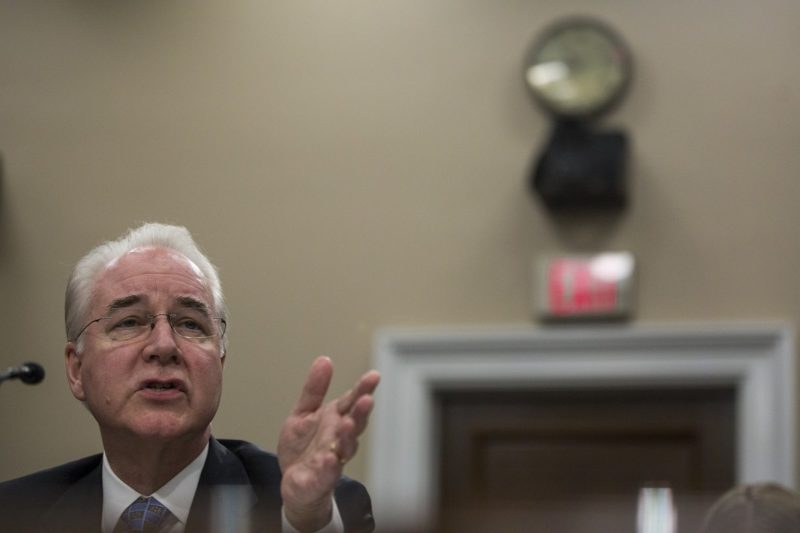West Virginia Reporter Arrested for Asking Questions of Trump Administration Member
A reporter for Public News Service was arrested while asking the head of Health and Human Services if domestic violence would be a pre-existing condition in the GOP's health-care plan.

A West Virginia reporter was arrested Tuesday night as he attempted to ask Secretary of Health and Human Services Tom Price whether domestic violence would be considered a pre-existing condition under the Republican plan to replace the Affordable Care Act.
“I was holding the phone out like this,” the reporter, Dan Heyman, told journalists gathered outside the West Virginia capitol after being released Tuesday night on a $5,000 bond. “I was trying to get as close to Secretary Price. I was yelling out questions, and that was it.”
Heyman was arrested by capitol police and charged with a criminal office of willful disruption of a government process, the first time he has been arrested in a journalism career of more than 30 years.
Heyman told Rewire he was attempting to ask Price about domestic violence, as Price walked with White House counselor Kellyanne Conway to a meeting with state lawmakers about the opioid crisis. Heyman said he was “persistent” in asking his question, but that he did not attempt to get through the barrier put up by the people surrounding Price, whom Heyman described as unidentified “men in suits,” not peace officers or secret service members, as claimed in the criminal complaint.
Heyman and his lawyer question what process he was allegedly disrupting; Price was ultimately able to attend the meeting.
“I never got in his way, or tried to,” Heyman said. “The criminal complaint says that I was trying to breach the barrier of the secret service agents, but I never tried to breach anybody. All I was doing was trying to reach out my phone to record his answers to a question.”
Heyman works for Public News Service, a nonprofit based in Colorado that publishes articles on matters of public interest and provides content to other publications. He told Rewire that all visitors to the capitol building must pass through a metal detector. “So they knew I was unarmed and all I was trying to do was get my phone close to him to record what he said. I wasn’t trying to get to him physically, I wasn’t trying to reach him or even get past his staff,” Heyman said.
The statute under which Heyman was charged carries a sentence of up to six months of imprisonment and a $100,000 fine, said Jamie Lynn Crofts, legal director of the American Civil Liberties Union of West Virginia, which is demanding that the charges be dropped, calling them a violation of the First Amendment.
Crofts, who spoke to reporters on the steps of the capitol building last night, called the arrest “horrifying.”
“Our First Amendment rights are under attack every day, particularly from the Trump administration, and it’s not surprising to me that an incident like this would happen when a reporter tried to ask a question of the member of the Trump administration,” she said. “They have shown us every day since Donald Trump took office that they don’t care about the First Amendment or the free press, and today was just another example of that happening.”
The arrest comes shortly after Desiree Fairooz was convicted of two charges arising from an incident in January, when she laughed at Attorney General Jeff Sessions during his U.S. Senate confirmation hearing.
Heyman insisted to Rewire that the key issue was not his arrest, but whether domestic violence could once again be considered a pre-existing condition under the GOP’s health plan, which he referred to as “Trumpcare.”
But after reflecting upon the growing count of convictions and arrests of people who have questioned the Trump administration—which has labeled the press as the “enemy of the people”—Heyman said, “that does kind of put a different shine on things.”
“These public servants have the right to expect protection of their physical safety. They have the right to have the secret service protect them,” he said. “But they do not have the right to be protected against uncomfortable questions.”

